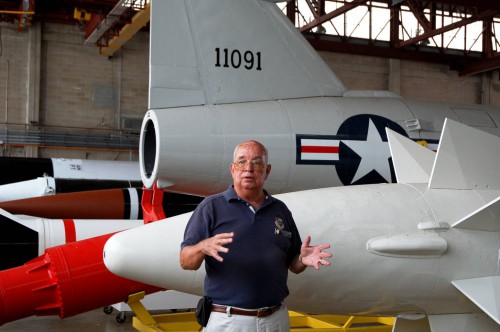
CAPE CANAVERAL, Fla — Most people that travel past Hangar R, located at Cape Canaveral Air Force Station (CCAFS) in Florida, don’t give the structure a second thought as they drive by. Perhaps they should, for the building contains a stunning array of spacecraft and launch vehicles that would be the envy of any museum.
The hangar looks virtually identical to so many other buildings at the historic site. When one steps inside the pale beige building, this perception changes. Rockets, spacecraft, and missiles, all in pristine condition, crowd the insides of Hangar R.
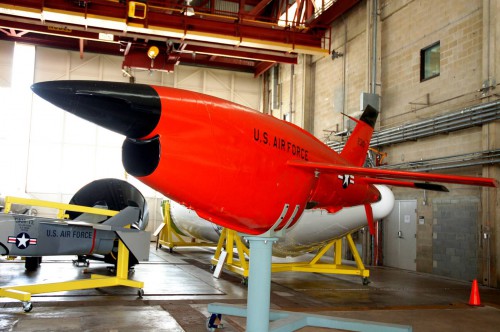
It is a stunning sight; the building is filled almost entirely with rocket mockups, actual launch vehicles, and boiler plates of spacecraft.
As mentioned, Hangar R sits side by side with the numerous other hangars at CCAFS. Most of these structures, while well-maintained, clearly were constructed in the early days of the U.S. Space Program.
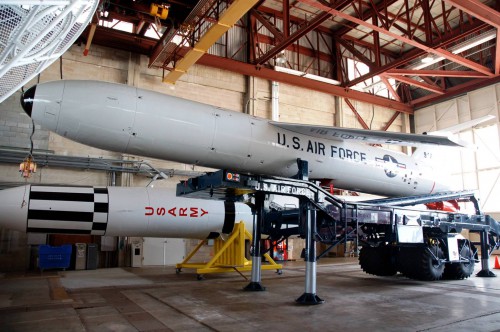
During NASA’s Gemini Program, astronauts flew beyond Earth’s atmosphere atop Titan rockets. A test article of one of the Gemini spacecraft resides in Hangar R. Nearby rests a boiler plate for the Apollo command module, and the name of the space agency that used the craft to send astronauts to the Moon, “NASA,” is boldly stenciled on its side.
The most striking residents of the hangar are, without a doubt, the rockets. Snarks, Matadors, BOMARCs, Deltas, and numerous other launch vehicles are crammed into Hangar R’s spacious interior.
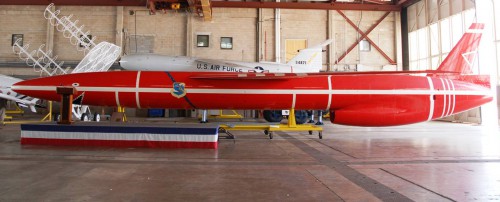
“These have all been refurbished to make them as close to new condition as possible,” said U.S. Air Force Space and Missile Center volunteer John Hilliard.
Hangar R’s residents all fall under the purview of the U.S. Space and Missile Museum. Many of the vehicles within Hangar R are over 50 years old, yet they look like they just came off of the production line.
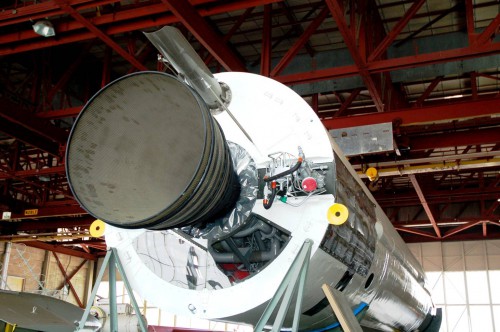
Plans are underway to move these historic vehicles to Hangar C, and guests who take the free tour offered by the U.S. Air Force will have the opportunity to view them for themselves. But what all is in Hanger R? The contents include the following:
Apollo Boiler Plate
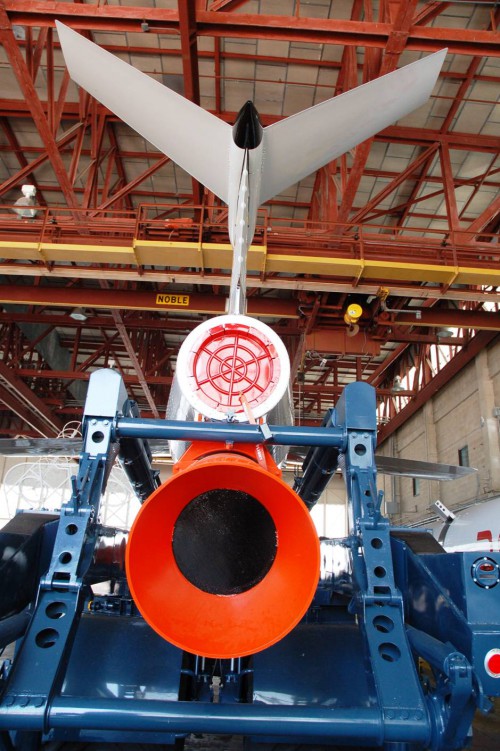
Gemini Boiler PlateBlue Scout JR
BOMARC A 10
Delta II Solid Rocket Motor
Firebee
Firebird
Jupiter
Mace
Matador
Polaris A-1
Quail
Rascal
Redstone
Recording Optical Tracking Instrument (ROTI)
RVX-1 Reentry Vehicle
Skybolt
Snark
Thor
Telemetry Antenna
As mentioned above, eventually these amazing artifacts will be moved to Cape Canaveral’s Hangar C and included in the tour offered by the U.S. Air Force. Visitors interested in seeing these vehicles firsthand should visit the Cape Canaveral Air Force Station Public Tour or contact 321-494-5945 to check on the status of the move.
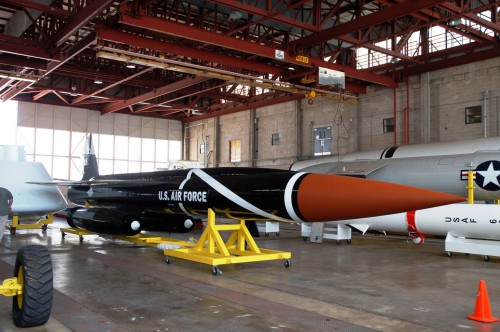




Excellent article Jason! Hanger R (or the soon to be new location, Hanger C,) will definitely be added to my “must see” list. I am very grateful to the unsung heroes who quietly go about their work preserving these irreplaceable space age icons for future generations, if only they could receive a fraction of the publicity, and the inevitable financial support, generated by the recent unveiling of wax statues of a deceased popular singer. (As a brief aside, I wonder if there are plans in the works for similar wax statues of Gagarin, Shepard, Armstrong . . .). Also Jason, thank you for highlighting one of the few contributions of Michigan to aerospace history, the BOMARC missile. A creation of Boeing and the Michigan Aerospace Research Center (hence the name), it was the only surface to air missile deployed by the Air Force. It also provided ongoing job security to the personnel of McGuire AFB, because after a BOMARC armed with a nuclear warhead caught fire leading to a plutonium leak, the Air Force sealed the area in concrete, and isn’t going to allow the area out of protective control. Thanks again Jason, and please continue the great work at AmericaSpace!
“KAROL” said it ALL….a stunning collection indeed! And a great thanks is due to all who preserved this legacy.
Karol raises an interesting idea – wax statues of Gagarin, Shepard, Armstrong, etc. This would be a fitting tribute to those brave astronauts who blazed the trail to space – like an “astronaut/cosmonaut hall of fame.” With biographies and memorabilia, it would bring those space heroes to life.
Mary and Tom, thank you so very much for your kind consideration, it is always a genuine pleasure to read your posts. An “Astronaut/Cosmonaut Hall of Fame”. What an EXCELLENT idea Tom! Please excuse me while I board the Carl Sagan “Starship of the Imagination”. Imagine individuals of the caliber of Jim Hillhouse, Jason Rihan, and Ben Evans with their extensive contacts, associations, and friendships in the space community using their best efforts in conjunction with the American Institute of Aeronautics and Astronautics, the American Astronautical Society and other such organizations in support of proven pro-NASA legislators such as Senator Shelby (R. Al.), Senator Nelson (D. Fla.) Rep Lamar Smith (R. Tx.) retired Senators Kay Bailey Hutchison (R. Tx.) and John Glenn (D. Ohio), et. al. to create a “Hall Of Heroes” at the most visited museum in the United States – the Air and Space Museum in Washington D.C. Imagine an exhibit with life-sized perfect replicas of a waving Gagarin before his historic flight, of Shepard pointing up at his Mercury/Redstone before launch, of Grissom, White, and Chaffee standing together, the heroic and cherished last crews of Challenger and Columbia, and our beloved Neil Armstrong. Imagine an international show of popular, grassroots support, a universal respect for and admiration of all that they believed in, through a “Kickstarter” on-line Internet fund-raising effort to pay for the exhibit. I know that I would eagerly donate to such an extraordinary effort, and I don’t think that I am alone in this regard. I dream of someday walking into such a “Hall of Heroes”, placing my hand on my sons’ shoulder and saying, “These incredible individuals are heroes, and my heroes. Their kind do not often come this way. Learn from them my son.” As King Arthur said in “Excalibur”, “It is a dream I have.”
Karol: You have expressed quite beautifully the concepts and protocols needed to make this happen. A “target date” could be the 50th anniversary of Apollo 11 although sooner would be much better. I am willing to participate and do whatever is needed to make this happen. Thank you.
Are these the artifacts that used to be sitting outside in the rocket park around the Redstone pad? They have been restored beautifully! They were just rotting there outside. Glad to see this!
Hi Mike,
No, most of those artifacts are still there & are part of the tour that both the U.S. Air Force & Kennedy Space Center Visitor Complex offer.
Sincerely, Jason Rhian – Editor, AmericaSpace